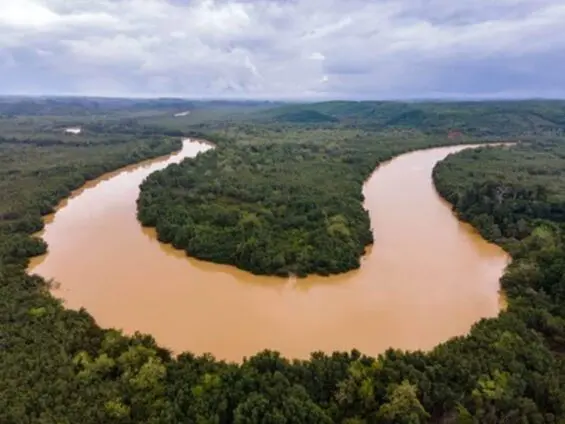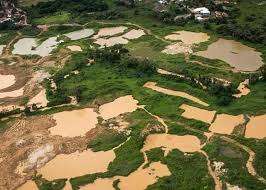The illegal mining activities known as “Galamsey” have wreaked havoc on the environment in Ghana, with predictions suggesting that it could take 300 years to restore the quality of soil devastated by this destructive practice.
Dr. Bright Boafo Boamah, a medical doctor and toxic ecologist, sheds light on the alarming consequences of illegal mining, particularly focusing on the impact on human and animal health and its far-reaching implications for industries like pharmaceuticals.
Meanwhile, according to the Council for Scientific and Industrial Research (CSIR), illegal mining has introduced unapproved chemicals and heavy metals into farmlands, causing extensive contamination.
Dr. Boamah echoed his sentiment, expressing concern over the legacy of environmental damage caused by Galamsey.
“This issue, I don’t want to sound nihilistic anyway, but then I think we go far beyond what we should do. What I think now is that, these sites are currently dealing with emerging contaminants in the world that we are trying to fight.”
Dr. Bright Boafo Boamah medical doctor and toxic ecologist
He pointed out that illegal mining is a problem that should have been relegated to the past, but the fact that it persists indicates that Ghana is lagging in its efforts to protect the environment.
However, the use of heavy metals in illegal mining poses long-term threats, particularly as these contaminants seep into the soil and water, making it increasingly difficult to rehabilitate the land.
The Impact on Human and Animal Health
The presence of heavy metals in the environment has far-reaching consequences, affecting food chains, drinking water, and general public health. He explained the interconnectedness of health systems.
“We are looking at human health, We are looking at animal health and the environment. So there’s this one health paradigm where we kind of put everything together, because we cannot separate human health from animal health.”
Dr. Bright Boafo Boamah medical doctor and toxic ecologist
The concept of “One Health,” as outlined by Dr. Boamah, underscored the importance of addressing environmental issues holistically. The contamination caused by illegal mining does not merely impact soil quality—it also affects the health of livestock that graze on contaminated lands and the communities that rely on these animals for food. Ingesting contaminated food or water can lead to various health problems, including neurological disorders, cancers, and reproductive issues.
Pharmaceutical Industry: A Sector at Risk
The environmental contamination caused by Galamsey is not only a health issue but also a significant threat to industries that rely on clean resources.
“Now looking at one industry that I foresee having a big issue in the pharmaceutical industry. Because in Ghana, I know, most of these industries, especially when it comes to the infusions that we use in the hospitals, they need this ultra-pure water and having these heavy metals in them, the treatment, it’s not that easy, and it’s very, expensive.”
Dr. Bright Boafo Boamah medical doctor and toxic ecologist
This highlighted the broader economic impact of Galamsey, as industries that depend on uncontaminated resources may struggle to meet production standards.
The increased cost of water treatment could lead to higher production costs, which may, in turn, raise the price of medical treatments for consumers.
A Call for Urgent Action
The scale of devastation caused by Galamsey necessitates immediate and comprehensive action from both government authorities and the public. Dr. Boamah’s reflections suggested that Ghana is “years back” in its efforts to combat environmental degradation.
There is a pressing need to address the issue of illegal mining, not only to restore the environment but also to protect public health and sustain vital industries.
Meanwhile, the CSIR’s grim forecast underscored the urgent need for a long-term strategy to address illegal mining and its consequences. Without prompt intervention, the contamination of farmlands and water sources will continue to have devastating effects on Ghana’s agriculture, health, and economy.

The Way Forward: Mitigating the Damage
To mitigate the damage caused by Galamsey, it is crucial to implement stricter regulations on mining activities and enforce penalties for those who engage in illegal operations. Moreover, rehabilitation efforts, such as reforestation and soil restoration projects, must be prioritized.
Dr. Boamah’s research suggested that a multi-sectoral approach is needed to tackle the issue, with collaboration between environmental agencies, healthcare providers, and industries.
Public education on the dangers of illegal mining is also vital. Communities must be made aware of the long-term consequences of Galamsey, both in terms of environmental degradation and health risks.
Furthermore, support for alternative livelihoods could help reduce the economic incentive for illegal mining, encouraging people to turn to sustainable practices instead.
The environmental devastation caused by illegal mining, as described by Dr. Bright Boafo Boamah, presented a dire challenge for Ghana.
The contamination of soil, water, and food supplies poses significant risks to human and animal health, while industries like pharmaceuticals face costly challenges in maintaining production standards.
Dr. Boamah’s call to action highlighted the urgent need for a collective effort to address Galamsey, protect public health, and restore the environment. As he noted, the issue is not just a legacy of the past but a pressing crisis that must be tackled today.



















